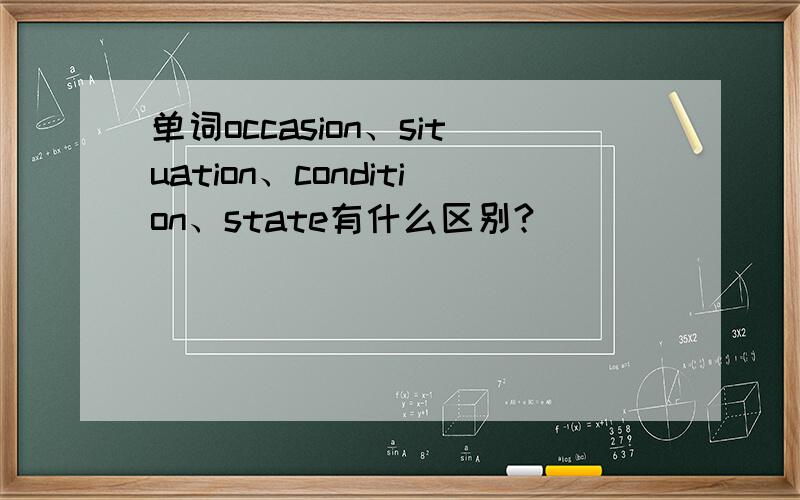单词occasion、situation、condition、state有什么区别?
来源:学生作业帮助网 编辑:作业帮 时间:2024/04/28 14:10:19

单词occasion、situation、condition、state有什么区别?
单词occasion、situation、condition、state有什么区别?
单词occasion、situation、condition、state有什么区别?
这些名词都表示人或事物存在的形式或方式.
State andcondition, the most general, are largely interchangeable:
State 和condition 最普通, 在多数情况下可以通用:
a state (or condition ) of disrepair; a healthy state (or condition ).
绝望的状态(或 condition ) ;健康状况 (或 condition ).
“Every body continues in its state of rest . . . unless it is compelled to change that state by forces impressed upon it” (Isaac Newton).
“每一个物体保持其静止状态…除非有加于其上的力,它才会改变那种状态” (伊萨克·牛顿).
“The condition of man . . . is a condition of war of everyone against everyone” (Thomas Hobbes).
“人类的状态…是人与人对抗的战争状态” (托马斯·霍布斯).
Situation more narrowly refers to a state or condition at a particular time as determined by a combination of circumstances:
Situation 较狭义地指由环境综合决定的特定时间上的状态或情形:
“Eternal truths will be neither true nor eternal unless they have fresh meaning for every new social situation” (Franklin D. Roosevelt).
“如果永恒真理不能赋予社会状况新的意义,则它既不为真理也不会永恒” (富兰克林·D·罗斯福).
Status usually applies to a person or thing considered in relation to others of the same class.With reference to persons it implies relative standing;with respect to things it is roughly equivalent tostate or situation :
Status 通常指被认为与同类或同阶层有关的人或物.指人时暗指相对的地位;指物时大致等同于State 或 situation :
“Mr. Polly's status was that of a guest pure and simple” (H.G. Wells).
“波利先生的身份纯粹是客人” ( H ·G·韦尔斯).
以上是比较笼统的字典式解释..具体你要领会区别还要多读英语书,长久之后你自然可以辨别了.